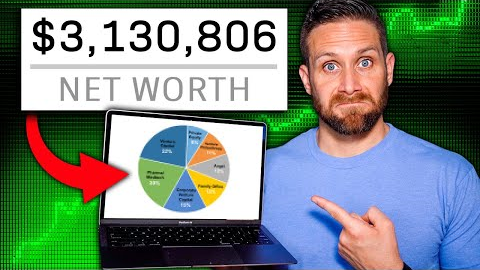The Order Of Investing Your Next $1,000
19,313 View
Share this Video
- Publish Date:
- July 29, 2023
- Category:
- How to Invest
- Video License
- Standard License
- Imported From:
- Youtube
Tags

Check Out My Recommendations (It helps support the channel):
🔥 M1 FINANCE Investing- Free $10 (once you deposit at least $100 within 30 days) https://bit.ly/427KBBn
Here's a video on how to use M1 Finance https://youtu.be/kEOS-w21U3c
📝 Empower (previously called "Personal Capital")- Free Net Worth Tracker & Retirement Planner https://personalcapital.sjv.io/3PBNmk
🔒 AURA - 14 day free trial to see if your personal information has been leaked online https://aura.com/jarrad
💎 WEBULL - Up to 12 Free Stocks When You Deposit Any Amount Of Money http://bit.ly/WeBullJM
💵 ROBINHOOD - 1 Free Stock https://join.robinhood.com/jarradm14
Join the Private Financial Independence Community for monthly private live streams, video calls (with myself and the community), as well as access to a discord group where we talk all things money (and a lot more): https://bit.ly/PrivateFI
📧 Business Inquiries: [email protected]
Contribute To Your 401k Match
No matter how much they offer, take it because they’re offering you free money here. A lot of people don’t realize that this is a part of your compensation just like your salary, healthcare, sick days, and vacation days. One thing to note which I don’t think a lot of people are aware of is that money that’s matched by your employer is automatically put into a Traditional 401k NOT a Roth 401k.
Pay Down Some Bad Debt
Pay off any bad debt that has an interest rate of 4 to 5% or higher. For rates less than that just pay the minimum payment and move on with your life. You can use the Dave Ramsey promoted debt snowball method where you pay off the lowest debt first or use the debt avalanche method where you pay the debt with the highest interest rate first. I’m a big fan of investing at least something while you’re paying off non-credit card debt so if you want to check that box with an employer match then great.
Invest In A Health Savings Account
This is purely based on the fact that this account offers you triple tax savings when money in the account is invested. What I mean by triple tax savings is that money goes into the account with pre-tax dollars, it grows tax-free, and can be withdrawn for medical expenses tax-free. One caveat is that if you use this money for non-medical expenses before the age of 65 then you’ll pay a penalty and taxes on the money so you should avoid this if possible. The good news is that if you happen to not need all of the HSA money for medical expenses then at the age of 65 you can use it for non-medical purposes.
Max Out Your Roth IRA
Contribute to a Roth if you’re within the income limit and contribute to a Traditional if you’re over the income limit...then decide if it makes sense to do a backdoor Roth from a Traditional IRA to a Roth IRA. It usually makes sense to try to get money into a Roth IRA if possible so the money can grow tax-free. Another good thing about a Roth IRA is that you can withdraw contributions at any point in time without paying early withdrawal penalties. As long as you don’t touch any of the investment gains then you’ll be fine.
Once all of those accounts have been maxed out it’s time to move back into accounts like a 401k, 457, and 403b. These are most likely going to end up being the largest accounts you own when it’s time to withdraw money to live off because you’re able to contribute so much more. With a 401k the max amount you can contribute in 2022 is $20,500. It usually jumps by $500 every year or every other year. This was the first time it jumped by $1k within a 1 year period since around 2005/2006.
If there’s money left that needs a home this is where you’d want to start putting it into a taxable investment account.
Affiliate Disclaimer: Some of the above may be affiliate links. Support the channel by signing up or purchasing through those links at no additional cost to you. I appreciate you for helping me keep this channel running
Disclaimer: This video is for entertainment purposes only. Everyone's situation is different so do your own research before making any decisions with your money. If you need help then contact a Certified Financial Fiduciary before trying anything that is mentioned in this video. I prefer a Fiduciary financial advisor that charges an hourly fee as opposed to an ongoing fee based on a % of your portfolio. Always remember that incentives determine the type of advice they give you so one that charges an hourly fee is less likely to be problematic.














